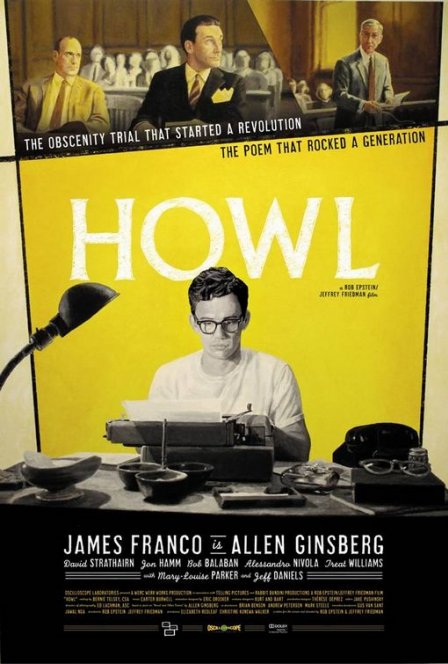Among the literary theories of the 20th century, New Criticism and New Historicism sit at opposite ends of the spectrum. For New Critics, the formal qualities of any work of literature are all that matters; in a sense, there is nothing but the words on the page. New Historicists, on the other hand, view literary works as a byproduct of an external culture; words trickle down through the vessel of the author from the world they experience. New Historicists have famously claimed that even non-literary works from the same cultural time and place can possess the same cultural insights and thematic concerns as something from the literary canon. While a debate between these two schools of thought would have been an anachronism in 1957, the year Allen Ginsberg’s poem “Howl” became the center of a landmark obscenity trial, Rob Epstein and Jeffrey Friedman’s retelling of that event in their film of the same name inserts this ahistorical critical battle directly into Ginsberg’s life.
Formally, the film Howl has four different threads woven together throughout its 90 minutes. In one, Ginsberg (James Franco) reads the poem for the first time at Six Gallery reading. The back story of the poem is then presented through a series of interviews with Ginsberg, with events sometimes unfolding dramatically in intermittent flashbacks. The dramatization of the trial that pitted prosecutor Ralph McIntosh (David Strathairn) against celebrity lawyer Jake Ehrlich (Jon Hamm) serves as the only “standard” narrative line. As literary critics and reviewers appear in testimony, this becomes the most obvious example of the aforementioned literary debate. The fourth movement is an animated interpretation of parts of “Howl,” as the poem continues in voice-over and at the reenacted Six Gallery performance.
Although this somewhat experimental structure might seem true to the wild and innovative spirit of Ginsberg, ultimately it drains any feeling of this very same spirit from his life. The faux documentary interviews, for one, seems like a particularly puzzling choice for both the filmmakers and Franco, taking the emotional dynamism that infuses the poem and reducing it to a flat, partial narration of events. Moreover, if anyone wanted to hear Ginsberg’s voice, they could easily read or listen to interviews or recordings. When combined with the arguing literary critics presented in the trial sequences, more often than not the film comes across as a lecture analyzing various sections of the poem. What Epstein and Friedman convey to us is never really a sense of who Allen Ginsberg was and how the world he lived in inspired him to define this cultural moment, but rather their filtered interpretation of why the poem is an important piece of literature. The animations, which could be an interesting area to shed more light on the poem’s significance or to delve into Ginsberg’s psyche, instead becomes Heavy Metal-like fantasy, hopping from details in the poem to the animators’ whims with little discernment.
Perhaps what is most interesting about the film is the ambiguity, intentional or not, as to which side in the literary debate the filmmakers finally take. Both Ginsberg’s telling of how the events in his life led to the writing of “Howl” and Ehrlich’s defense against more formalist critics as to the poem’s portrayal of society’s underrepresented elements squarely suggest a New Historical reading. Indeed, the genesis of this film seems to imply that one cannot appreciate “Howl” without understanding its underpinnings. But if we are to know “Howl” best through knowing the culture surrounding it, where is that in this film? Where is the rebellious energy that caused the Beats to reject post-war American values? Where are Ginsberg’s personal demons, not just the cartoon version of Moloch? Instead of showing this, the filmmakers opt for formal experimentation of the kind that one of the film’s antagonists claims is necessary to produce great literature. Does this mean that there is still room for debate, or did they simply misunderstand their own argument for interpreting a great work of literature?

